To run a successful event, you need an ace team and the Centre was again extremely fortunate to have such a group of people. I will come to those at Canterbury in a minute but first I want to thank all the brilliant speakers. I shall be naming everyone further down in this marathon post, but I feel it is important to highlight just how fortunate we were this weekend to have people of international scholarly renown who were prepared to give up their weekend to ‘bring to Canterbury’ their expertise, their vast knowledge, their good humour, and their willingness to engage with a whole host of questions from our audiences – THANK YOU!
Because we were online this year, we did not have our usual great postgraduate and undergraduate team of student helpers. Nevertheless, I do want to record my thanks to Dean Irwin and Jane Richardson, two postgraduates, who with Dr Diane Heath did provide tweets for much of the weekend using the History Weekend’s #TudorsStuarts21 and Dean’s sterling work in this regard warrants a special mention. Dr Claire Bartram, the Centre’s Co-Director, was also involved in this way, so thanks Claire. To demonstrate the coverage, one of Diane’s tweets was seen by 3,405 people and another by 3,416! As in previous years we will corral them to bring you a flavour of Tudors and Stuarts 2021, which we hope will form part of the Weekend’s legacy on the Centre’s website. As always, we will need Matthew Crockatt’s expertise for this, so thanks in advance, Matthew, as well as for creating the Tudors and Stuarts 2021 webpages in the first place, we are very grateful.
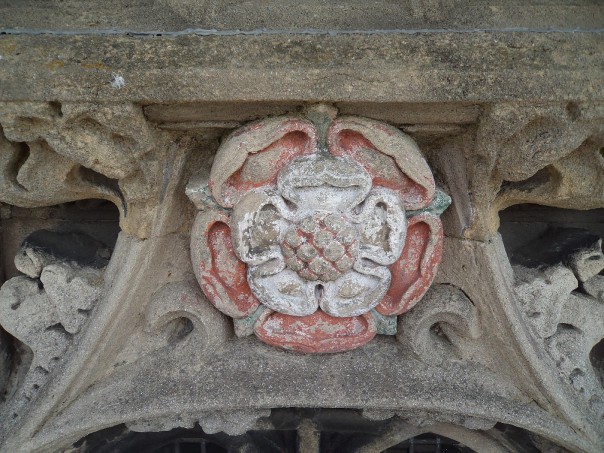
Keeping with CCCU assistance, we should like to thank Kellie Hogben in the box office for setting up the ticketing for the Weekend, as well as to Katie McGown, the Arts and Culture Manager, for her assistance. We are very grateful to Craig Dadds and his team for setting up the virtual ‘Tudors and Stuarts 2021 bookstore’ on the CCCU Bookshop website and this can still be accessed at: https://bookshop.canterbury.ac.uk/canterbury-history-weekend-2021
In normal years we have had AV support but this time around such support has been the difference between stunning success and abject failure. Diane and I cannot thank Toby Charlton-Taylor enough for his expertise, his lateral thinking when presented with yet another issue involving Teams, his seemingly infinite patience when we were trying to ensure access for presenters from a wide range of devices, systems etc, and his willingness to go way beyond the extra mile to ensure that it all worked. Fortunately none of this was in the least bit evident to our audiences (Paul’s sudden, but fortunately short-lived, disappearance after the film will remain a mystery), but that was because Toby had been prepared to help us get it all right in the fortnight beforehand and then as new problems reared their heads over the weekend itself. Thanks, too, to his colleague Laurence Ranger, who was similarly present during the weekend, and, as well as helping on the production side, was able to assist several ticket holders who experienced problems accessing the lectures on their devices.
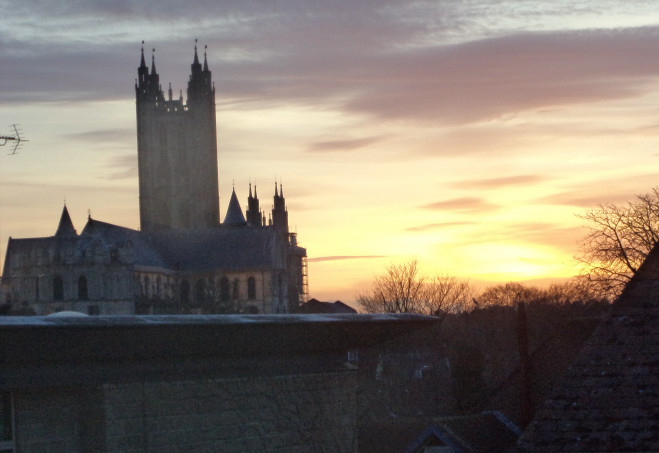
Diane Heath has been mentioned a couple of times already, which should indicate how crucial she has been for the success of the History Weekend. As my colleague and co-producer throughout the setting up, run-up and the weekend itself, I cannot say sufficiently how immensely grateful I am to have been working with Diane. As controller of the ‘Starship Fynden’ (Fynden is a building on campus), Diane has been doing the CCCU equivalent of ‘beam them up Scottie’ by helping to bring in our speakers and their PowerPoints to be ready to ‘go live’, which we did at the designated start time throughout the weekend – no mean achievement with 13 sessions over 2 days! I should also like to say many thanks to Kitty Wheater for her invaluable assistance.
Before I come to our distinguished speakers, I just want to thank our audiences and in terms of numbers watching, I don’t think we fell below 75 for any sessions and on several occasions we were close to 170 (geographically widespread coverage too: from France to the United States, and across the UK and the Irish Republic). Firstly, many thanks for being willing to pay to try this online format, and even more for trying Teams when so much is on Zoom. We appreciate your fortitude and sense of adventure because it helps us to raise money for the Ian Coulson Memorial Postgraduate Award fund. Secondly, thanks for sending in a wonderful array of questions for our speakers. Sometimes the Q&A part of a session sees a mass exit by online attendees, but it was great to see how numbers kept up and great questions kept coming in, which meant all sessions were their scheduled hour and I let the two before lunch and the last in the day run over very slightly to get all the questions in. Thirdly, very many thanks for your kind comments and I hope you don’t mind but I’m going to put a few here, as well as showing examples below for specific speakers.
“What a fascinating weekend, so pleased l attended, I managed to do all the lectures – it got a bit addictive.”
“Thank you, Sheila and all your colleagues, for a fantastic weekend. Interesting and enlightening from start to finish. I actually watched all 13, which I hadn’t intended to do! That’s how good it was.”
“You must be exhilarated and exhausted after your marathon weekend! What a triumph! There was a buzz about the place right from the start and lots of questions which showed our engagement. No glitches apparent either.”
“I just wanted to e mail you personally to say an ENORMOUS thank you for organising this weekend. I feel like I have been Supercharged with Tudor knowledge….. my lessons will now have a blend of lots of new ideas…. 🙂 I do so hope my students attended as many talks as possible. Ian Coulson would be so proud of what you organised, he helped me a lot when I was a young Head of Department…. it was a special weekend…. like swimming in Tudor chocolate…. (I know that is an anachronism) but it underlines the wonderful indulgence of this 2 day ‘field of the cloth of Tudor gold’!! I am starting to think I am quite privileged to teach the Tudors because of moments like these that allow me to see their story in so much greater clarity!”
“Thank you for a brilliant two days. Everything went smoothly at this end your instructions were very clear. We almost felt as though we were on holiday you took us away from the horrors of the last twelve months and gave us a feast of new knowledge and insight. Oh how we miss seeing you all in person. Thank you all so very much.”
“Congratulations on organising and managing an excellent weekend – I didn’t manage to listen to everything but of those I heard, I particularly enjoyed Alec Ryrie, Matthew Johnson and Onyeka Nubia. Bravo to Diane and Dean for tweeting, and especially to Diane for finding some images to go with Andy (Wood)’s talk! All the work behind the scenes is really appreciated… now looking forward to 2022…”
“NOT A QUESTION, but a big thank you to all who made this wonderful succession of cerebral work-outs such a triumph. The key workers in admin and AV did an impeccable job and the line-up of presenters was awesome – all of them at the top of their game and all of them excelling in the Q&As. Thank you again and roll on 2022!”
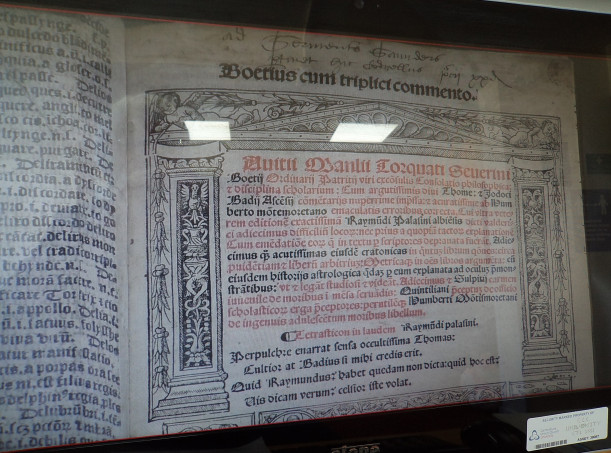
So now to the films and lectures, and, as the ethos behind all these History Weekends has been the sense ‘of being there’, of it being an occasion, a special time, I’m going to give just a few personal reflections on each of the 13 sessions, rather than a more conventional summary, not least because I would not be able to do justice to these outstanding speakers! Dr David Shaw’s understanding of the early printed book trade is legendry, and the way he could bring together knowledge of French type faces and woodcut illustrative production to pinpoint the year and place of publication of a glossed edition of Boethius’ Consolation of Philosophy was a brilliant illustration of his expertise. Moreover, his exposition of why this mattered similarly demonstrated the depth of his scholarship.
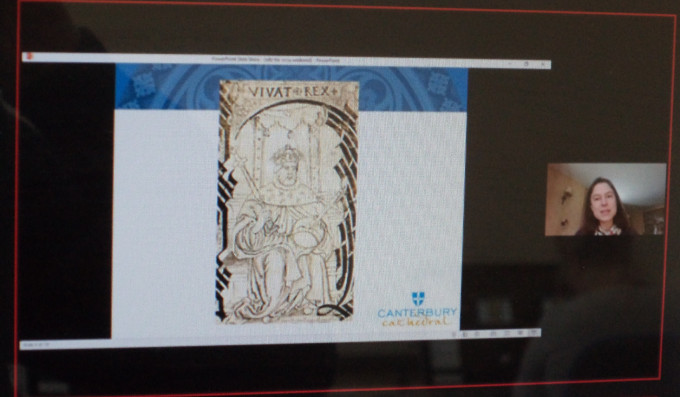
As a sucker for maps, I was delighted that Cressida Williams’ presentation in this first session with David’s film featured several late 16th– and early 17th-century maps of Canterbury. So did attendees, “we enjoyed it very much” and “Thanks, I enjoyed your talk” For me, one of the most interesting features is the trajectory of the viewer, and this in a sense standing behind the mapmaker offers a means of seeing that gives a way into post-Reformation, and perhaps more specifically Elizabethan cultural perceptions of Canterbury. In contrast, the slightly later map, often said to date from c.1640 suggests a different perspective and purpose, foregrounding ideas about civic identity and jurisdictional relationships, if not conflict.
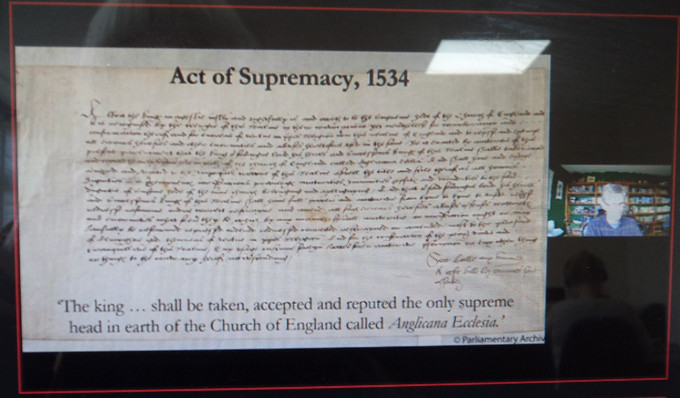
The ideological war over possessive pronouns between the clergy and the crown regarding who might be seen as holding, defending, owning or embodying the Church of England was a fascinating undercurrent in Professor Alec Ryrie’s excellent assessment of what this ‘Church of England’ meant to specific Tudor monarchs, to their Stuart successors, as well as to their subjects. Equally fascinating were the varying responses by these same subjects in England, Scotland and Ireland, and how these reactions were also dynamic against a backdrop of homegrown influences added to those from continental Europe. Another aspect of this that especially interested me was how different groups within society attempted to negotiate their way through what was at times a morass of theological disputation. Moreover it mattered, for contemporaries the fate of souls was at stake and in our world today I think it is difficult if not impossible to really grasp emotionally, as well as spiritually, just how serious this was for people. All of these terrific strands were evident to attendees, as shown by the comment “A terrific paper on the construction and reconstruction of the Church of England – many thanks”. Finally, and on a far lighter note, the Dean of Canterbury Cathedral’s cats had better watch out because there is another feline on the block, and Bubbles was attempting to steal the show if she (I think?) had not been unceremoniously ejected from Alec’s study.
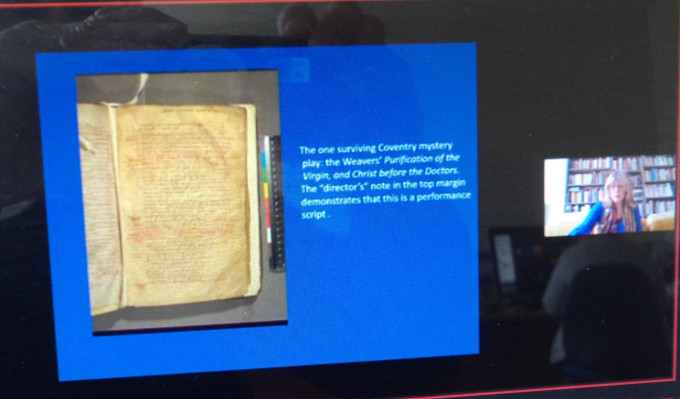
Professor Pamela King similarly drew admiration for her investigation of the provenance of the manuscript copies of biblical drama that have come down to us from the 15th and 16th centuries – “Thank you for a fascinating exploration of the manuscripts”. In her analysis of this special interest displayed by antiquarians was the role of Roman Catholic families in the diocese of Chester who generally kept their heads down and their libraries well stocked. Such conserving of the past might be envisaged in theological terms, yet equally might speak to ideas about antiquity, authenticity and authority while ideas about cultural memory are similarly part of this mix. Additionally, having taught The Second Shepherds’ Play from the Towneley manuscript for more than a decade, I was very interested to hear that ideas about its dating and composition have changed recently with a shift to a probable mid-16th-century date. This is interesting in and of itself, but for someone who used to be in farming and who went to college in Lancashire, it had the added dimension of the playwright’s commentary on contemporary agrarian conditions.
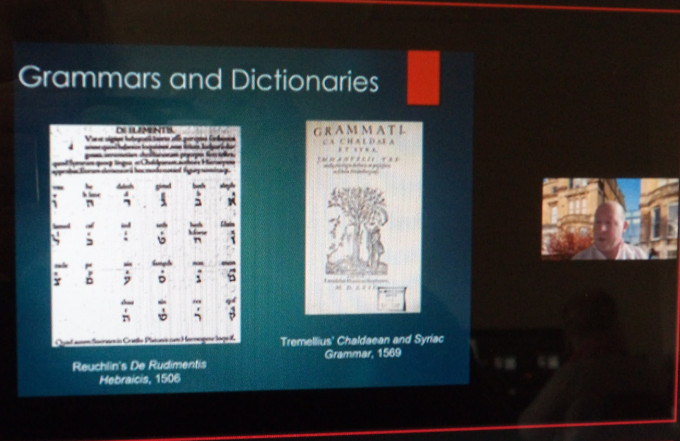
Shifting registers, Dr Kenneth Austin’s discussion concerning the readmission of Jews to England in the aftermath of the Whitehall Conference of 1655 was thought provoking in many ways, elucidating the comment “terrific paper”, but I want to mention the role of the Hebrew language. Of course, knowledge of a specific language had been weaponised before, and again since, but, as Kenneth, demonstrated knowledge is power. Not that this desire to know Hebrew was motivated to gain a better understanding of the Jews or the chance to enhance Judaeo-Christian relations because instead the primary aim was to substantiate claims of having the true Bible, but potentially it was a positive by-product. The second aspect of Kenneth’s enlightening lecture that I want to mention is the contemporary idea in 17th-century England that for the English to be God’s ‘chosen nation’ the Jews had to return so that the Book of Revelation could be fulfilled through their conversion. Of itself this was hardly encouraging to Jewish families in Amsterdam, but like the expansion of those wanting to learn Hebrew, it did present an opportunity which the continental European Jews were prepared to take.
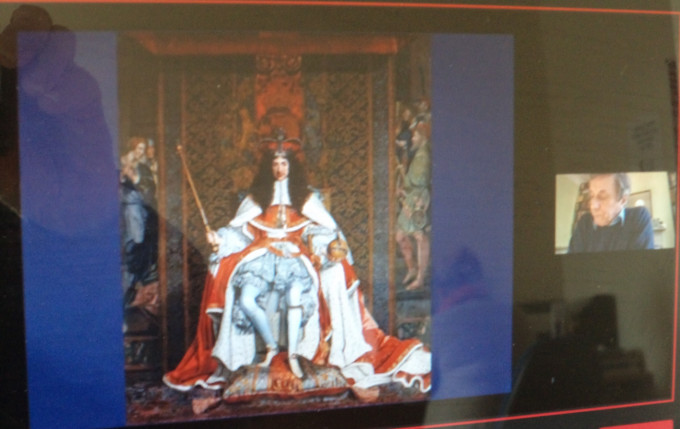
Staying with religion and what might be termed the return of the exile, Professor Kenneth Fincham took us on a fascinating tour around the British Isles regarding Charles II’s religious settlement in his three kingdoms following his Restoration in 1660. For me Kenneth’s characterisation of Charles, echoing Ronald Hutton, of him being the slippery rather than the merry monarch seemed highly telling. For Charles’ eel-like form might be seen as resulting in the imposition of a ‘straightjacket’ Church form on his kingdoms that worked well enough for him but caused divisions and dissentions that lasted for centuries. Thus, I would echo the comment, “Thank you so much for your paper!”
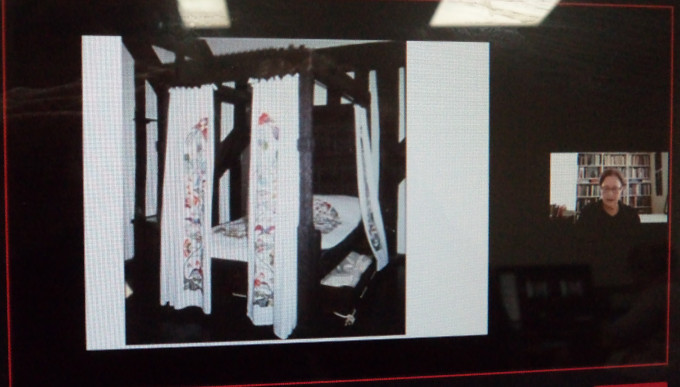
Moving to Elizabethan Stratford, Professor Lena Orlin gave her audience a brilliant exposition on how to investigate those below the elite who have left very few traces in the archives. For as several people said, “Real detective work! Thank you”, and it was indeed that, but it was far more than that, which is why it was my favourite. Yes, Lena gave us a ‘portrait’ of Anne Hathaway, but through her analysis of Anne’s peers in Stratford, she demonstrated the value of prosopography, as well as how to undertake such case studies. Thus, it was fascinating to watch how she dropped into place the different pieces of the jig-saw puzzle, and at the same time gave her audience a running commentary about the lives of these (upper) ‘middling-sort’ wives – their familial, affinal, household, business, neighbourhood and communal connections and activities – a tour de force and many, many thanks!
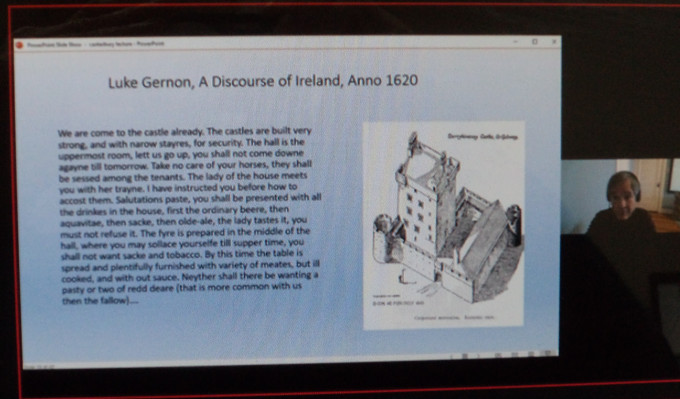
Ending the day with Professor Matthew Johnson’s afterlife of the medieval castle worked so well, as someone said, “Terrific paper many thanks indeed Professor Johnson”. Having met Matthew decades ago in Canterbury for a study day on urban, vernacular buildings I knew his audience members were in for a treat, and they were not disappointed. His idea of the biographical life of a castle, including possibly its destruction or partial demolition is an excellent approach, especially because his analysis sets the castle in its landscape, an important aspect sometimes forgotten. For this ‘self-fashioning’ by castle owners drew on ideas of seeing, of trajectory and use, including such matters as processional ways and the siting of vernacular buildings – houses etc in the associated settlement. While I could mention his assessment of Bodiam Castle here, instead I want to highlight what for me was an eye-opener, that is just how many tower houses there were in Ireland. Ok, I visited a couple decades ago in the Scottish borders, but as a fortified residence geared to ‘everyday living’, these Irish ones were extremely numerous, as well as fascinating.
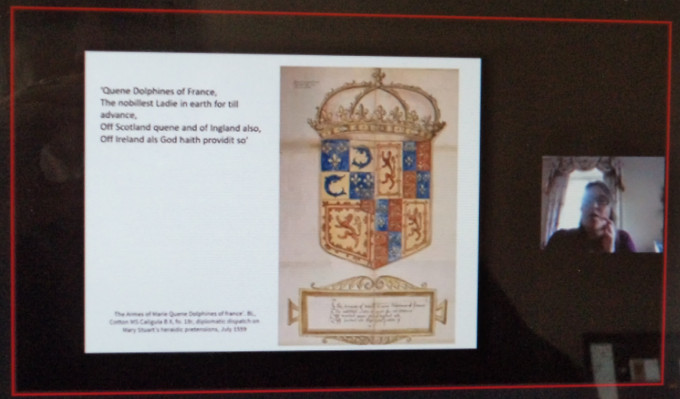
Sunday morning brought another treat, Dr Amy Blakeway’s terrific analysis of the very real threat Mary Queen of Scots posed to Elizabeth I, her cousin. Amy is brilliant at involving her audience and taking them through the details, and on Sunday it was even more impressive because she was having to deal with a mischievous puppy called Bramble at the same time – so one feline and one canine – excellent! It was great watching Amy assemble her argument in this ultimately deadly game between these two intelligent queens which had several intriguing twists and turns. Moreover, for all their (and supporters) respective deployment of statecraft, which was considerable, in some ways the tipping points might be seen as relating to Mary as a woman – the birth of her son James, the rape and her consequent pregnancy at the hands of Bothwell. So I would wholeheartedly agree: “Thanks, Amy really enjoyed your talk. What a great paper!”
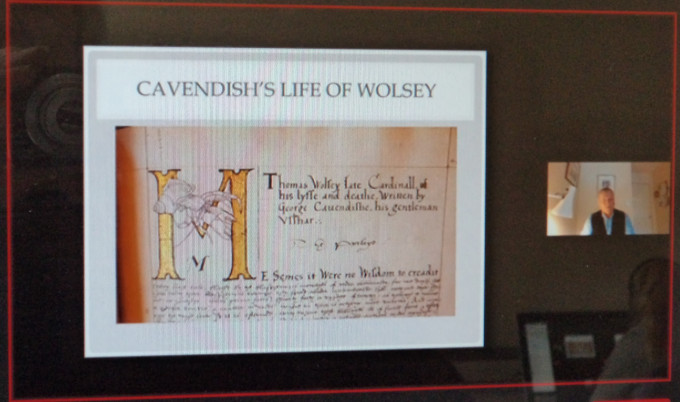
For another equally, but very different dynamic relationship between two clever individuals, Professor Glenn Richardson explored what may be seen as the inter-dependency of Thomas Wolsey and Henry VIII. Watching how this unfolded as Glenn took his audience through the evidence was fascinating, especially Wolsey’s care to ‘act in the king’s name’ as his loyal servant at all times. Furthermore, the sheer energy of Wolsey and the breadth of his interests was well discussed by Glenn in his presentation, a factor recognised in one of the audience’s comments that it was a “Really absorbing lecture. Many thanks”. From a personal perspective, I was particularly interested to learn that Wolsey had envisaged creating what would have amounted to a network of grammar schools in towns across England to act as feeder schools to the new university colleges, especially his own Cardinal’s College at Oxford.
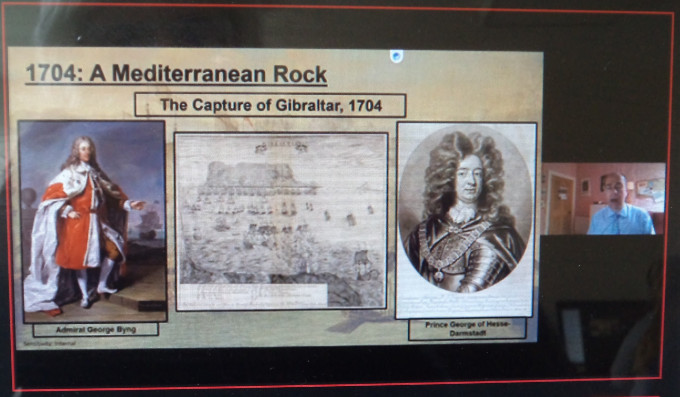
After lunch we had a considerable change of theatre, heading to the Mediterranean, as Professor Keith McLay examined a British military strategy that is often seen as beginning in the mid-18th century, but which he convincingly argued had been deployed from as early as William III’s reign to challenge the expansionist policies of Louis XIV of France. Keith’s lecture was terrific. However, it was his responses to the various questions afterwards that I thought brought home Keith’s expertise. To be honest my own favourite was his answer to the problems of communication between naval and army commanders, and just how and when this became especially challenging during an amphibious assault. As someone put is “Many thanks indeed for such an informative and fascinating paper.”
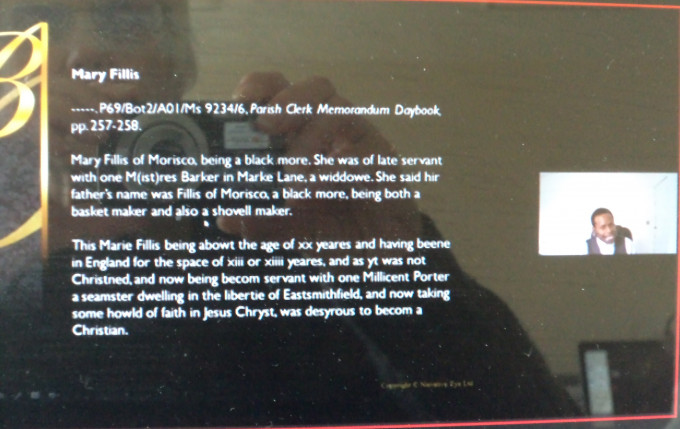
Taking his audience on a voyage of discovery to find ‘England’s Other Countrymen’, Dr Onyeka Nubia provided a challenge to what he sees are the lazy stereotypes of much of the historiography regarding the Tudor period. His assessment of the presence, not the absence, of black people in early modern England needs to be foregrounded in the literature, as do attitudes towards those of different ethnic backgrounds, demonstrating that diversity in this sense should not be seen as a modern phenomenon. This exciting presentation was matched by Onyeka’s enthusiasm for his topic, and it was excellent to see how he was able to reinforce his point during the Q&A about the presence of black people as servants as not some kind of slavery (or 19th-century Upstairs-Downstairs), but that life-cycle servanthood was an extremely widespread rite of passage for most in England. It offered young men and women the opportunity to learn vital occupational and other skills, and some money, thereby providing the chance for marriage and an independent household. Thanks Onyeka for putting the record straight! For as someone said “How can we encourage more critical and expansive narratives of people of African descent in England, separate from the predominate narrative of slavery?”
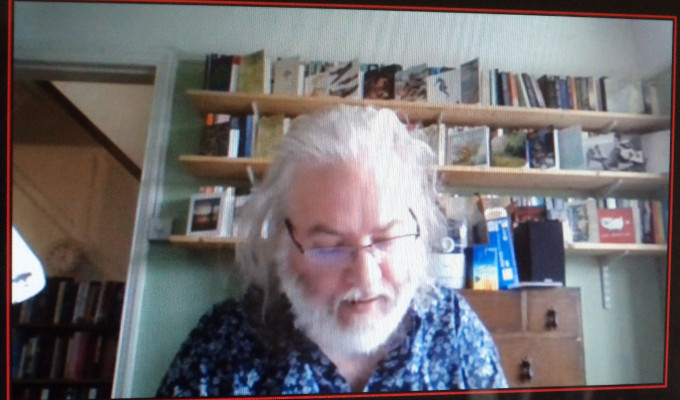
Professor Andy Wood, too, explored the lives of early modern working people, but many of those he described using material from the secular as well as church courts, were poor or poorer people. Some were recipients of parish charity or who found themselves in the local workhouse or bridewell, but others managed to stay just above this level through their own efforts, at times helped by family, friends and neighbours. Again, having spent time in farming, although I never wielded a scythe only a sickle, it was great to hear Andy’s argument about how and why wage rates varied concerning specific tasks during the agrarian year, and the role gender and regional differences played in this. Another topic he explored that I especially enjoyed was his analysis of social differences based on the notion of who did/didn’t undertake manual labour, and how this fed into the polemical literature of the period. Others shared my sentiments, including “Many many thanks to Professor Andy Wood for his terrific paper”.
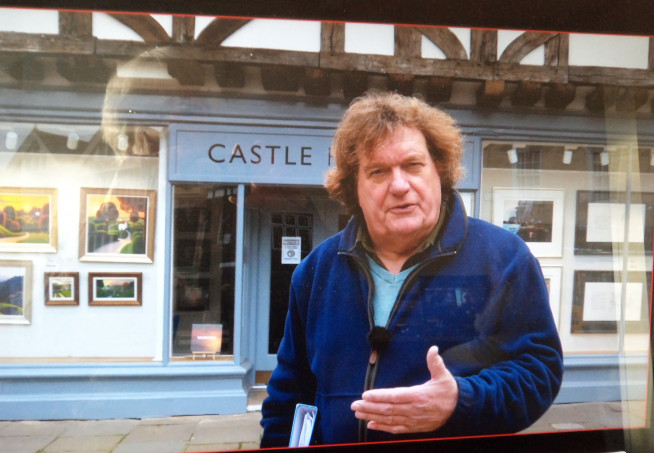
For those of you who ‘were there’ or have been counting, this brings me to the final session and the film produced by a recent CCCU film studies graduate Alex Hudson of Professor Paul Bennett’s ‘Early Tudor Canterbury’. Alex now has her own company and for the film she was assisted by a current film studies student Max Barrett. All things being equal, I am hoping Matthew Crockatt will soon be able to add the film to the Centre’s webpages. Consequently, I won’t spoil it for you and please do look after it goes up, I’ll let you know in the blog, because as someone commented “Thank you for a fascinating film”. Then, of course, we had the disappearing Paul, but as my brother said later, great to inject a touch of humour and things can go wrong in even the best well-oiled operations, and we certainly aren’t that!! However, having got him back, Paul gave the audience a further great ‘tour’ around early modern Canterbury for he is a walking encyclopedia on the city’s history. Then as a grand finale he answered several questions, meaning that we finished three minutes ‘late’, which I think is pretty good going over two long days.
Congratulations to all those who have made it to the end of the blog, I promise it will be a much shorter one next week and in the meantime all of us at the Centre wish you a Happy Easter!
 Centre for Kent History and Heritage
Centre for Kent History and Heritage Sheila Sweetinburgh
Sheila Sweetinburgh 1734
1734

